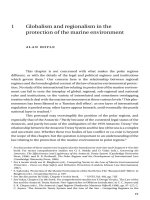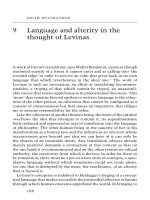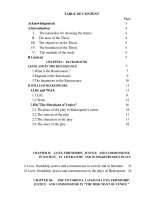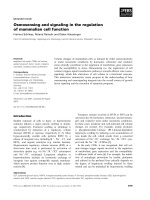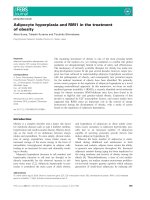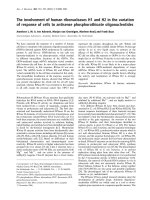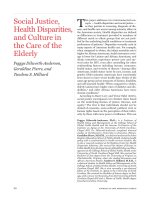Language and alterity in the thought of Levinas
Bạn đang xem bản rút gọn của tài liệu. Xem và tải ngay bản đầy đủ của tài liệu tại đây (148.72 KB, 18 trang )
edith wyschogrod
9 Language and alterity in the
thought of Levinas
A workof literary translation, says Walter Benjamin, exists as though
stationed outside of a forest it cannot enter and as calling into ‘the
wooded ridge’ in order to receive an echo that gives backin its own
language that which reverberates in the alien one.
1
The workof
Levinas is such an invocation, an effort at translating incommen-
surables, a troping of that which cannot be troped, an unassimil-
able excess that resists apprehension in propositional discourse. This
‘more’ that remains beyond spoken or written language is the other-
ness of the other person, an otherness that cannot be configured as a
content of consciousness but that issues an imperative that obliges
me to assume responsibility for the other.
Like the otherness of another human being, the more of the infinite
overflows the idea that attempts to contain it, its superabundance
both traduced and expressed in acts of translation into the language
of philosophy. The other human being in the sanctity of her or his
manifestation as a human face and the infinite as an ideatum whose
excessiveness goes beyond any idea we can have of it can only be
the objects of an insatiable desire. Any translation (always already
merely putative) demands a contraction of this content so that on
the one hand it is communicated and on
the other retains its ethical
authority, the exteriority from which it derives. In order for there to
be translation, there must be a pre-existent store of concepts, a spec-
ulative language without which translation could not come about,
yet one that is disrupted by the more, the exorbitance, of an alterity
that is beyond it.
Levinas’s enterprise is indebted
to Heidegger’s forging of a concep-
tual language that makes accessible the primordial affective relations
through which human existents apprehend the world. In bringing to
188
Language and alterity 189
the fore what Levinas calls the pathic elements hitherto refractory
to philosophical speculation, Heidegger offers an account of these
affects in light of the meaning of Being. Taking the verb ‘to be’ as
active, Heidegger attributes to Being the activity that had generally
been ascribed to the existent. Meaning for the Heidegger of Being and
Time is, in Levinas’s view, disclosed in terms of the ontological dif-
ference, the difference between Being and beings. Yet it is precisely
Heidegger’s interpreting of Being as active, as the power of Being,
rather than turning to the Good that Plato had discerned as lying
beyond Being, that leads Levinas to dissociate his thought from that
of Heidegger. Acknowledging his indebtedness, Levinas neverthe-
less feels compelled to ‘leave the climate of that philosophy’ (
ee
19).
Heidegger’s account of the relationship of human beings to Being as
power, Levinas maintains, can only engender
political and economic
relations founded on violence.
To challenge this violence still another act of translation is re-
quired, one that brings to the fore the commanding kerygma of the
Hebrew Scriptures and the Talmud, the rabbinic commentary on
Scripture in the language of Western thought not, per impossibile,
to exhume their underlying equivalence
but rather to correct the
hubris of philosophical rationality. The mandate of absolute alterity
condensed for him in the synecdoche ‘Hebrew’ calls into question
the self-satisfaction of philosophy that penetrates even philosophy’s
moments of incertitude. Despite his critical appraisal of philosophy
as the conceptual language of ontology and of Being’s potential for
violence, Levinas never reneges on his allegiance to the rationality
of Western thought without which the ethical could not be brought
within human purview. The essential taskof language is not to ex-
press what cannot be expressed,
the excess that lies beyond being.
Rather thought that betrays as it exposes this excess can be regarded
as envisaging a certain difference, as a thinking of the ligature be-
tween philosophy and that which transcends it, that separates as it
unites them.
In what follows, I shall discuss the multiplicity of meanings at-
tributed to language in Levinas’s thought. I shall turn first to the
ways in which sensibility, the infra-cognitive world of sensation
and enjoyment, and totality, the historical whole, cultural, politi-
cal and economic as constituted by thought, may be disrupted. In
this context, I focus upon the face of the other who is beyond the
190 the cambridge companion to levinas
totality, the other who is seen as elevated and without history and
who insinuates her/himself into my world as my interlocutor. Al-
ways already language, the face of the other intrudes into the totality
that has been historically constituted and issues a call to responsi-
bility. Understood in Hegelian terms, ‘the face breaks the system’
(
en
34).
Next, I shall consider language as gift, as a bestowal of significa-
tion upon another. Thence I turn to the ‘dionysian’ languages of art
and of a certain poetics contested by Levinas. Finally I discuss an
ethics that becomes discourse, a discourse that becomes ethics. A
language that is prior to speech, one that is always already ethical,
will be seen in its relation to propositional discourse, the language of
linguistic practices and ‘semantic glimmerings’. Language is not de-
fined as the transposition of words into referents or by the formalism
of the relation of signifiers to one another but as an ethical relation, a
responsibility to the other person, ‘a semantics of proximity’ (
os
93).
2
It could be argued that this order of enquiry suggests a developmental
sequence in the workof Levinas who denies that there
is, in the man-
ner of Heidegger, a significant Kehre in his thinking.
3
Yet despite the
thematic unity of its preoccupation with the ethical relation, differ-
ences of approach may be discerned. Totality and Infinity (1961) and
the essays of this period consider the disruptions of alterity within
the constraints of ontological language whereas Otherwise than
Being or Beyond Essence (1974) describes the unlimited accusation
of self by the other, the radical passivity of subjectivity, the ethical
that is the primordial signification of the one-for-the-other that gives
rise to the distinction between the Saying and said.
4
totality and its undoing
Totality is for Levinas a freighted term that includes epistemologi-
cal, historical and political meanings. In its broadest signification,
totality designates a whole, such that ‘a multiplicity of objects ...
or in a homogeneous continuum, a multiplicity of points or of ele-
ments [that] form a unity, or come without remainder under a sole
act of thought’ (
at
39).
5
Levinas points to the danger of a thought
so encompassing that the intellectual act that intends the whole
loses touch with the world in its concreteness and is left with the
pure form of the thinkable thus returning to the Kantian problem of
Language and alterity 191
the transcendental unity of apperception (
at
41). Hegel, he argues,
understands this dichotomization and tries to breach the real and
the rational by organizing the parts heuristically into a system, a
system of history. ‘The true function of totalizing thought does not
consist in looking at being, but in determining it by organizing it’
(
at
47).
6
For Levinas, such organization or totalization is an expres-
sion of freedom, one that is intrinsically time tied, so that
total-
ity’s historical dimension is not merely incidental but integral to it:
history is totalization itself (
at
47).
The politics that Levinas sees embedded in this history is a politics
of war and cannot be overcome by way of the fragile peace that su-
pervenes upon war. As in Hegel’s phenomenology, ‘the trial by force
is the test of the real’ (
ti
21). The totality can be disrupted only by
that which lies outside it, a dimension Levinas does not hesitate to
call eschatology. The term is not to be understood teleologically as
referring to the aim of some future time but rather as the instituting
of a relation that is beyond the totality and as a drawing of beings
out of history, beings who always already speak(
ti
22).
If there is a content whose excessiveness overflows the capacity of
consciousness to contain it, one that cannot become the aim of cogni-
tive intention or of a need that can be satisfied, this more must be the
object of a desire that precludes satiety. Such an excess is the human
face whose exposure is prior to thematization, to phenomenological
description. Although beyond discursive formulation, the face dis-
closes itself as language. What is expressed is united with the one
who expresses in a ligation that binds and unbinds what can never
be made commensurable.
For Levinas, ‘to present oneself as other is to signify or to have
meaning. To present oneself as signifying is to speak’ (
ti
65–6).
Speech that emanates from another is always already a pedagogy,
a magisterial
putting into questions of cognition. The arena of ethics
is not a level playing field in which all are alike but rather one in
which self and other are absolutely asymmetrical. Levinas contends
that ‘the presentation of the face is not true, for the true refers to
the non-true, its eternal contemporary ...The presentation of being
in the face does not leave any logical place for its contradictory’
(
ti
201).
7
In sum, the depiction of alterity seems to thematize the
other, but language is always already an address to and from the other
who cannot be contained within a common genus as an essence of
192 the cambridge companion to levinas
human being. Discourse is the experience of absolute exteriority, an
otherness that is foreign, ‘a traumatism of astonishment’ (
ti
73).
alterity and the universal
Could it not be argued that even if the other commands me in a rela-
tion to which I alone can respond that the other finds her- or himself
in a comparable situation so that each one becomes a self in so far as
she/he is solicited by another? In that case, each other is like every
other other and ethics is in fact grounded in the universal.
8
Otherness
in the absence of individual specificity would then become a vacuous
concept, an otherness common to all or as one critic would have it:
‘To respect the other in his non-objective subjectivity ...means only
to respect first the general community which is bound together by [a]
generalized otherness’, that Levinas, however, means to surmount.
9
In a complex argument
that in part responds to the criticism
that undifferentiable alterity entails an empty universality, Derrida
points to the inherent necessity of the betrayal of the beyond of on-
tology. He contends that Levinas takes calculated risks when tying
together spoken language and the beyond in such a way that calcu-
lation leaves room for the incalculable.
10
It is the language of the
ligature between the before and the beyond that attests that there is
a beyond, that which cannot come into plenary presence. ‘Contam-
ination is no longer a riskbut a fatality that must be assumed.’
11
Within this contaminated frameworkof a language, the self as the
irreplaceable one, says, ‘At this very moment, here I am [me voici]’,
thereby offering her-/himself as hostage for the other, as a singularity
that defies description yet
at the same time speaks.
But, as Derrida reveals, there is still another issue at stake, that of
distinguishing the human other from the infinite other. In explaining
Levinas’s claim, ‘Tout autre est tout autre [Every other one is every
bit other]’, Derrida shows that the sentence need not be read as a
tautology, that two senses of tout may be distinguished which, in
turn, lead to differentiable uses of autre:
If the first tout is an indefinite pronominal adjective [some, some other one],
then the first autre becomes a noun and the second [an adverb of quantity
(totally, absolutely radically infinitely other)] in all probability, an adjective
or attribute. One no longer has a case of tautology but instead a radical
Language and alterity 193
heterology; indeed this introduces the principle of the most irreducible
heterology.
12
At the same time, if the homonyms are read tautologously, the
sentence can be glossed as a swallowing up of the other, an interpre-
tation that could be seen as an entering wedge into a Kierkegaardian
reading. On this view, Derrida claims, the other does not disappear
but introduces into a hetero-tautological dimension, the altogether
other who is God. To be sure, Kierkegaard attributes homogeneity
to human others – the ethical is the universal – whereas God is the
altogether other. But in the hope of rescuing human singularity by
seeing every human other as other than every other other, Levinas
cannot, as he would wish, distinguish between human others and the
infinite other. Derrida concludes that no line could then be drawn
between the ethical and the religious.
13
This conclusion is borne out
by Levinas’s remark: ‘If the word religion is ...to indicate that the re-
lation between men, irreducible to understanding ...in human faces
joins the infinite – I accept that ethical resonance of the word with
all its Kantian reverberations’ (
en
8).
the gift of discourse
The meaning of gift made thematic in French thought from Marcel
Mauss to Georges Bataille is seen by Derrida as a key motif
that wends its way through Levinas’s understanding of alterity. For
Levinas death is the gift that can be given to the other. In his cri-
tique of Heidegger’s account of mortality, Levinas faults Heidegger
for seeing death as one’s ownmost possibility and for the additional
claim that the call of responsibility is first heard in the Jemeinigkeit
of my death. In its being-towards-death, Dasein answers first and
foremost for itself. By contrast, for Levinas, my ipseity, ‘the same-
ness of myself’, is constituted post hoc through my relation to the
other.
14
I am always already included in the death of the other as
being called upon to sacrifice myself for the other. As an irreplace-
able substitute for her or him, I bestow upon her or him the gift
of death. ‘Death, source of all myths, is present only in the Other,
and only in him does it summon me urgently to my final essence,
to my responsibility’ (
ti
179). Yet for Levinas gift-giving is bound
up with the notion of economy without which the gift cannot be
194 the cambridge companion to levinas
understood. The world as signification opened up by utterance is
given to the other as language, a signification that challenges the life
of economy. Far from analysing the globalization of economy or the
commodification of discourse, Levinas envisages economic relations
as rooted in more basic world relations that may be traced to Heideg-
ger’s descriptions of the primordial comportments that characterize
being in the world, comportments that for Levinas include need, en-
joyment, habitation and, as arising out of habitation, work.
15
Levinas
contends that workreduces the otherness of
the world to the same
but the worker does not control what is produced by the activity of
labour. ‘Works have a destiny independent of the I, are integrated
in an ensemble of works ...maintained in the anonymity of money’
(
ti
176).
16
Bought, sold and interpreted by others, works no longer
express the I of my interiority. What is true for me holds also for the
works of others.
Workderives from a self that lives in a home, departs from and
returns to it. It is as habitation, as home, that a space is opened that
enables one to represent things and from which the face
of another
may be encountered, another who calls the self that has emerged
as a separated being into question and who ‘paralyzes possession’.
By disengaging the self from objects, language contests relations of
possession, the realm of economy understood in terms of money,
ownership and exchange. ‘The calling in question of the I, coexten-
sive with the manifestation of the Other in the face, we call language’
(
ti
171), Levinas avers.
Far from reflecting the fall of a primordial speech, language as ac-
tual discourse is not the regrettable traducing of alterity, a violation
of transcendence, but a gift, an offering of that which is thematized
to the other. ‘To thematize is to offer the world to the other in speech’
(
ti
209), to manifest beings through representation and concept,
to say what they are. Knowledge is the correlation between in-
tending acts of consciousness, a consciousness that posits itself as
self-identity, and the objects intended. In its relation with what is
other than itself, it reduces the alterity of its object to the same. But
language as gift exceeds the speech that brings objects into plenary
presence to include the bearer of discourse, the one who calls
violence into question. In the absence of the other, the meaning of
individuals emanates from the totality whose significance derives
from power that is ultimately expressed in war (
ti
24). The cessation
